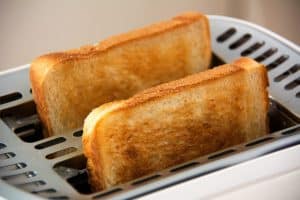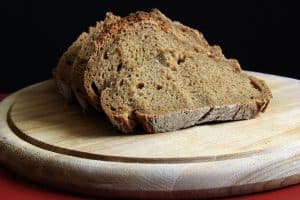Bread is one of the foods that I end up talking most about. Probably due to the fact it is a major component of the Western diet. Most lunches are bread based, many breakfasts have toast in them and it’s not uncommon to snack on a slice of the loaf. It also seems to be one of the food people love, but people say it doesn’t love them! As a carbohydrate food it is usually right up the top of the foods that cause anxiety for those with an eating disorder.
So let’s look at it in more depth.
Am I Intolerant to it?
Bread is made from wheat, which contains gluten. So instantly we have 2 substances that can cause a reaction in people. Those with coeliac disease will definitely need to avoid bread. For some people bread can lead to bloating due to the wheat content. Wheat is a high Fodmap food which means that for some people, with IBS, it may be poorly digested and absorbed. Instead it will pass through to the large intestine where it will ferment. Bacteria will feed on it, releasing Co2 which causes the bloating. I myself am in this category with a wheat intolerance and any more than 1/4 slice of bread will cause me issues the next day.
However for some people, it is not the wheat of the gluten that is caused the issues. It is the portion size. Eat too much of anything and you will be bloated, have tummy ache, feel lethargic and pretty awful. It can be all too easy to overdo the bread products and therefore have a reaction. Some common sense is needed to work this one out, is it the bread or is it the amount? If you can eat plenty of other wheat/gluten foods (pasta, cous cous, pitta, wraps, crackers) then I would suspect it is the portion size. Everyone has different levels of tolerance to different foods, so even if you are sensitive you may be able to eat a small amount regularly. Test it out, keeping a diary of how much you have and what symptoms you get.
Food allergy/intolerances are actually less common than you may think, less than 2% of the population suffer from one. A much larger proportion of people think they have a problem and will cut food groups out without medical advice however.
As a dietitian, I certainly don’t want people to be cutting bread out of their diet. Bread is a convenient and can be a nutritious food to be eating. In this day and age of living life on the run and wanting instant everything, easy grab and go food is often a necessity. Being able to grab a sandwich or make a slice of toast quickly can be very helpful.
The nutrition, crusts and all:
2 slices of wholemeal bread will provide (% of the RNI):
20-25% Calcium
20-30% Vitamin B1
5-18% Niacin
10-20% Vitamin B6
10-16% Folate
5-7% Vitamin E
Bread also contains some iron, zinc, magnesium and manganese. So it is actually a nutritious food to have in our diets. Wholemeal bread provides some fibre, about 1.9g per slice and this is about the same for half white, half wholemeal brands, whilst white bread is lower in fibre content. Going for the wholemeal is always the better option, but there are occasions I recommend white bread too and it is often on the food challenges list for my eating disorder clients.
Is bread fattening?
Bread is actually not fattening, 2 slices provide around 190kcals and 2g fat. So it is not the bread but what we spread on it and the portion size. 4 slices of buttered toast with melted cheese on top will be very different to 2 slices of toast with a thin spread of margarine and marmite. For some people bread is one of those foods that they struggle to stop eating, so 1 slice turns into 6. If that is you, remember it is not the bread that is the issue here! One tip is to try keeping the bread in the freezer and only keep out the slices you need for the day.
How to beat the bloat:
Yes bread can 100% cause bloating. Often that is due to the portion size of carbohydrates eaten at that meal. Take a look at see how much of your meal was taken up with carbs. I eat carbs at every meal but they may up 1/4 to 1/3 of my daily intake. On days when I haven’t eaten as many starchy foods I can definitely feel the difference, my energy levels are sapped and I don’t feel as satisfied, leading to more frequent snacking. I live an active lifestyle with 3 small children and a Pilates business (I am teaching or exercising every day), so carbs are my friend.
If your portion size is sensible, take a look at other factors. Is it really the bread or is the bread an easy target? Stress, anxiety, inactivity, fizzy drinks, beans and pulses, alcohol and caffeine can all lead to bloating.
Have you increased your fibre intake in a bid to improve your diet? When you increase the fibre content you can initially suffer from some bloating, but your body will adapt. Avoiding the bread can actually lead to constipation and a deficit of fibre in your diet. Few of us in the UK meet the fibre recommendations as it is and bread is an important fibre provider.
Try chewing well and eating slowly.
Sitting down to eat and having good posture.
Having a calm mealtime, away from work related activity.
Be more active during the day.
Stay hydrated with water, steer away from fizzy drinks, too much caffeine and alcohol.
So should you eat bread?
Unless you have coeliac disease or are one of the few who suffer from an intolerance, then Yes. Just be aware of the portion size, be sensible what you spread on it and go wholegrain. As with most things, Enjoy it sensibly.


